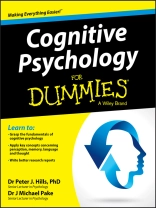Demystify the core concepts of cognitive psychology
Written specifically for psychology students — and not
other academics — Cognitive Psychology For Dummies is an
accessible and entertaining introduction to the field. Unlike the
dense and jargon-laden content found in most psychology textbooks,
this practical guide provides readers with easy-to-understand
explanations of the fundamental elements of cognitive psychology so
that they are able obtain a firm grasp of the material.
Cognitive Psychology For Dummies follows the structure of
a typical university course, which makes it the perfect supplement
for students in need of a clear and enjoyable overview of the
topic. The complexities of a field that explores internal mental
processes — including the study of how people perceive,
remember, think, speak, and solve problems — can be
overwhelming for first-year psychology students. This practical
resource cuts through the academic-speak to provide a clear
understanding of the most important elements of cognitive
psychology.
* Obtain a practical understanding of the core concepts of
cognitive psychology
* Supplement required course reading with clear and
easy-to-understand overviews
* Gain confidence in your ability to apply your knowledge of
cognitive psychology
* Prepare for upcoming exams or topic discussions
Cognitive Psychology For Dummies is the perfect resource
for psychology students who need a clear and readable overview of
the core concepts of cognitive psychology.
Содержание
Introduction 1
Part I: Getting Started with Cognitive Psychology 5
Chapter 1: Understanding Cognition: How You Think, See, Speak and Are! 7
Chapter 2: Studying Cognitive Psychology Means Studying the Everyday 19
Chapter 3: Improving Academic Performance with Cognitive Psychology 27
Part II: Attending to the Subtleties of Perception 41
Chapter 4: Perceiving the World around You 43
Chapter 5: Seeing How People See Depth and Colour 63
Chapter 6: Recognising Objects and People 81
Chapter 7: Atten-hut! Paying Attention to Attention 99
Part III: Minding Your Memory 115
Chapter 8: Where Did I Put My Keys? Short-Term Memory 117
Chapter 9: You Don’t Remember Our Wedding Day? Long-Term Memory 135
Chapter 10: Knowing about Knowledge 153
Chapter 11: Discovering Why You Forget Things 167
Chapter 12: Memorising in the Real World 179
Part IV: Communicating What Your Brain Thinks about Language 191
Chapter 13: Communicating the Extraordinary Nature of Language 193
Chapter 14: Studying the Structure of Language 211
Chapter 15: Talking about Language Perception and Production 225
Chapter 16: Discovering the Links between Language and Thought 239
Part V: Thinking Your Way around Thought 253
Chapter 17: Uncovering How People Solve Problems 255
Chapter 18: Thinking Logically about Reasoning 267
Chapter 19: Making Up Your Mind: Decision-Making 281
Chapter 20: Thinking Clearly about the Role of Emotions 293
Part VI: The Part of Tens 311
Chapter 21: Studying Patients with Brain Damage 313
Chapter 22: Ten Tips for Writing Successful Research Reports 321
Chapter 23: Busting Ten Cognitive Psychology Myths 329
Index 335
Об авторе
Dr Peter J. Hills, Ph D, is a principal lecturer and Head of Education in psychology at Bournemouth University. Dr J Michael Pake is a senior lecturer in Psychology at Anglia Ruskin University.












